CSUN Students Ready for the Future as They Graduate
The COVID-19 pandemic has changed much about the past academic year, including how California State University, Northridge will be celebrating commencement.
This year, CSUN marked the graduation of its students with an all-university virtual commencement ceremony on Saturday, May 15. College-based virtual ceremonies — where each graduate will be recognized by name and with a photo — are scheduled to take place May 21-24. In addition, a series of in-car commencement parades will take place the week of May 25.
There are more than 11,500 graduates in the class of 2020-21. Each student’s story is unique. Below are just some of their stories:
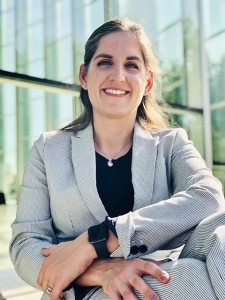
Tracy Albers
Tracy Albers, B.S. in Computer Science, with a Minor in Mathematics, College of Engineering and Computer Science
Tracy Albers, 35, of Los Angeles, knew she wanted to go to college right after high school, but she didn’t know what she wanted to major in.
“So, I dabbled in community college for a while,” she said. “Then the recession hit, and I needed to work.”
Albers found a job at a local hospital as a phlebotomist, someone who draws blood. About eight years later, while sitting the hospital’s breakroom, she had a revelation.
“It hit me that I wanted to go back to school and major in computer science,” she said. “It was that clarity I never had fresh out of high school. That night, I went and signed up at my local community college to get back into the swing of things.”
Albers and her husband, Garrett, did not take her decision to return to college lightly. They relied on both their incomes to make ends meet, and her job came with health insurance. They studied their finances, made some adjustments, and her employer allowed her to work part time.
“Our biggest concerns were finances, but my husband supported me all the way,” she said.
She took classes at Los Angeles Valley and Mission colleges to refresh her academic skills and prepare her for the rigors of studying a complex subject like computer science.
“Why computer science?” she asked. “Because it’s one of the majors where you don’t have a single category that you work in for the rest of your life. Every company needs a computer scientist, whether it’s NASA or Target. The sheer versatility of the degree means you can do a variety of things in a variety of fields.”
She earned her associate’s degrees in computer science and mathematics from Mission College in 2019 and immediately transferred to CSUN. At the time, she and her husband lived in Lake View Terrace and they would drive past CSUN on a regular basis. “It was such a beautiful campus that I knew I would love to go there,” she said.
What cemented her decision was a four-week boot camp Albers took at the university that trained community college students in doing rigorous academic research.
“My husband and I walked around, checking out the orange grove and some of the beautiful architecture on campus,” she said. “That’s when I decided I really wanted to go to CSUN.”
At the university, Albers was invited to join AIMS2 (Attract, Inspire, Mentor and Support Students), which is designed to improve the retention of underrepresented students in engineering and computer science. The program provided her with a peer mentor who showed her where everything was on campus, and provided her support when needed.
When she was offered the chance to be an AIMS2 peer mentor last year, “I jumped at it,” Albers said. “I wanted to be able to help other students like me feel more welcome and to have someone to go to for help. Even if I don’t know how to help, I might know people who do. I want to help them solve their problems so that they don’t feel like they’re on their own.”
While the pandemic disrupted life and forced her classes online, Albers said she understands why the university moved to a mostly virtual format.
“I know we all missed a lot, particularly social events like birthdays and Mother’s Day celebrations, but it’s not worth putting people’s lives at risk,” she said.
Last summer, Albers interned with the Aerospace Corporation in El Segundo. The corporation provides technical guidance and advice on all aspects of space missions to military, civil, and commercial customers. The corporation has offered her a job upon graduation.
“While it’s still very true that I think computer science is a versatile field with lots of opportunities, I really want to work on space exploration projects,” she said. “I’m so excited to work for Aerospace doing research and development on some of their satellites! It’s like I landed my dream job fresh out of school!”
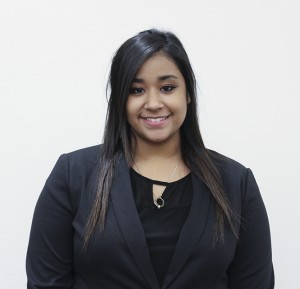
Michelle Alcantara
Michelle Alcantara, B.S. in Biotechnology and Cell and Molecular Biology, with a Minor in Chemistry, College of Science and Mathematics
Michelle Alcantara, 24, of Simi Valley, is the first to admit that she wasn’t the greatest student in high school. The same could be said about her first year at CSUN. She started out as an accounting major because her mother worked at an accounting firm, not because she was interested in the subject. She wasn’t excited by her classes, and it showed in her grades.
Alcantara considered dropping out — “it didn’t seem like college was for me,” she said — but decided to stick it out for the rest of the academic year. Then she took general education classes in chemistry and biology.
“They were the only classes I got an A in my freshman year,” Alcantara said. “I always felt I wasn’t a good student, that I wasn’t competent enough to belong in a science field. But these classes captured my attention, and really pushed me. I went to my advisor and said that I wanted to switch my major.”
The first-generation college student found she excelled in the sciences. Her grades soared. She became a University Scholar and, eventually, a Presidential Scholar. (Both scholarships are merit based.) She also became part of BUILD PODER (Building Infrastructure to Diversity and Promoting Opportunities for Diversity in Education and Research), CSUN’s undergraduate biomedical research training program, where she worked with health administration professor Kyusuk “Stephan” Chung to develop a Spanish-language video to educate the Latino community about end-of-life care options that extend beyond putting a loved one in the hospital.
Alcantara spent the summer of 2018 at the University of Michigan, where she studied mutational changes in the brain tumor called Diffuse Intrinsic Pontine Glioma. She spent the summer of 2019 at the University of Oregon doing virology research on a soybean pathogen. Her time in Oregon complemented the research she has been doing for the past two years with CSUN biology professor Yoshie Hanzawa on understanding the genetic expression of soybeans at a cellular level.
“Soybeans are actually really, really essential,” Alcantara said. “Not only are they food — so high in protein for humans and animals — they actually are an alternative to regular diesel. They make really clean burning renewable energy. To understand how soybeans can optimally be reproduced and the pathogens that can destroy soybeans is really essential. Not only for a cleaner Earth, but a healthier Earth.”
The pandemic interrupted Alcantara’s research, but it cemented her dream of becoming a medical doctor who conducts research, an M.D-Ph.D. She helped care for her grandmother until she died last year. Her grandfather tested positive for COVID-19 in November 2020, and died in January 2021 after weeks in intensive care.
“We’ve all lost so much because of the pandemic, some more than others,” she said. “My research was interrupted. We couldn’t go to class. Some of us lost family members, loved ones, and have holes in our hearts that can never be filled. But it has also reaffirmed that I am on the right path, that I do want to be a physician-scientist, where I can look into these types of diseases, influence health policy and provide care to the communities who will be most directly impacted.
“We are going to face other diseases in the future, not just mutations of COVID-19, and we know that these diseases hit my community — the Latino community — the indigenous community and the Black community the hardest,” Alcantara said. “I want to use science and medicine to help these communities.”
Alcantara, who is graduating with honors in biotechnology and cell and molecular biology, will return to CSUN in the fall to pursue her master’s degree in biology, and complete the research she is doing in Hanzawa’s lab, before applying to M.D.-Ph.D. programs the following year.
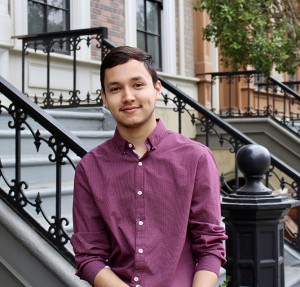
Xavier Alexandre
Xavier Alexandre, B.A. in English/Writing, College of Humanities
A series of fortuitous meetings have opened doors that are leading Xavier Alexandre, 26, of North Hills, to the next significant step in establishing a career in the entertainment industry — earning a bachelor’s degree in English with an emphasis in creative writing, and a full-time, paid internship with The Walt Disney Studios. It’s an opportunity he didn’t even imagine during his final year in high school years ago.
Alexandre first entered the foster care system when he was 8 years old and his sister was only weeks old. A family member took custody of the children for a while but, by the time Alexandre was 15, they were back in the system. His sister was placed with distant relatives. Alexandre bounced from foster family to foster family until a chance conversation with an aunt he never met before at weekend family gathering.
“Soon after, she started the process to get custody of me,” he said. “She provided me a home, made sure I had everything I needed and became a second mother to me.”
Alexandre had no intention of going onto college when he graduated from high school. No one in his family had ever gone, and he was worried that he would need information from his biological parents to apply. A random meeting with a college counselor changed his mind. She told him that, as a foster child, parental information would not be a factor. Though he missed most of the college application deadlines, the counselor personally walked him through the community college application process.
“She, and my aunt, are the first angels who showed up in my life just when I needed them,” he said.
Alexandre enrolled at Los Angeles Valley College in 2014, before transferring to CSUN in 2018. That time period and his first two years at Northridge were not easy, as he struggled with the lack of support provided to youth, who, when they turn 18, are “aged out” of the foster care system, including finding permanent housing. A chance conversation with a former mentor helped him find a place to live. He also found assistance through the Guardian Scholars Program at Valley College and CSUN’s Milt and Debbie Valera EOP Resilient Scholars Program. Both programs provide support to current and former foster youth.
It was through the Resilient Scholars Program that Alexandre learned about the Ready to Succeed Program, which provides career development guidance to current and former foster youth. The program connected him with mentors in the entertainment field, including the showrunner for the television series “The Walking Dead.”
While the pandemic caused some problems, it also provided Alexandre an opportunity to hunker down and focus on his studies. He is finishing his final semester at CSUN with straight As and a new mentor, in the form of English professor Martin Pousson.
“It’s amazing how much he gets me, and how much he has been there for me when I needed someone to talk to and believe in me,” Alexandre said.
He said Pousson re-enforced his passion for storytelling.
“I want to be able to tell the story, not of my life necessarily, but of the lives of people who have been in the foster system, who are part of the LGBTQ+ community, and the people out there who inspire us and keep us going,” he said.
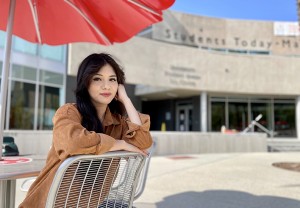
Melanie Alvarez
Melanie Alvarez, B.S. in Political Science, College of Social and Behavioral Sciences
College was not something that Melanie Alvarez, 21, of Los Angeles, thought about a lot growing up. Her parents were undocumented and had come to the United States from Mexico as teenagers with a baby, Melanie.
“At first, the goal was just to finish high school, something they never got to do,” Alvarez said. “By my junior year in high school, I had gotten involved in school and knew I wanted to go to college. My parents were very supportive. They always told me that education was the only thing they could make sure I had, the one thing that would support me once they were gone.”
As the first in her family to go to college, Alvarez prepared for a culture shock the first time she stepped onto the CSUN campus.
“Instead, I felt welcomed,” she said. “People looked like me and the professors were people of color. I felt at home.”
She was eager to get involved in the college life, but found the 40-minute commute one way from her Los Angeles home was too exhausting. That prompted one of the hardest conversations she thought she’d ever have with her parents.
“Though they’d always been supportive of me, I wasn’t sure how serious they would be when I asked to move out,” she said. “My mom said, ‘We’ll support you in whatever you want.’ Next thing I knew, I was bringing my mom the lease papers for an apartment and she was ready with a truck.”
Alvarez moved closer to CSUN her sophomore year, and threw herself into campus life. She started with the Dream Center, which supports undocumented students. She wanted to use her experiences as an undocumented student to help others. That led her to the University Student Union (USU), a student-centered, non-profit organization that works to expand the college experience through various programs, services, employment, and involvement opportunities.
She joined a USU committee on diversity and inclusion and quickly became more and more involved until this past year, when she was elected chair of the USU’s board of directors and helped govern the organization virtually during the pandemic. Through her position on the USU board, Alvarez helped shape the university’s response to the pandemic.
Alvarez also used her time at CSUN to train as a volunteer tax preparer with the university’s Volunteer Income Tax Assistance (VITA) Clinic, which provides cost-free tax service for low-income individuals in the community.
“It was kind of scary,” she said, “because most of the students who volunteer with VITA are accounting majors. But I learned so much and it’s information I can use to help low-income members of the community, like my parents, with something that can be very confusing to them — filing their taxes.”
Off campus, Alvarez volunteers with a couple of nonprofits that work with high schoolers and their parents, educating them about civic engagement and opportunities for higher education. She also has a part-time job at a restaurant.
The next step after graduation for Alvarez is getting a master’s degree in educational leadership and a job in higher education.
“When I first started college, I thought I wanted to be a lawyer and use the law to advocate for my community and communities of color,” she said. “My time at CSUN has taught me the impact working in high education can have on young people, particularly young people of color. The system isn’t created for people of color. You need to understand the system to make change, and education goes a long way in doing that.
“Besides,” she added, “I can always get a law degree later.”
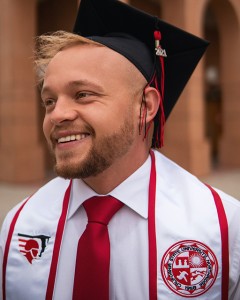
Clayton Dahm
Clayton Dahm, B.S. in Marketing, David Nazarian College of Business and Economics
Clayton Dahm, 26, of Northridge, had always heard that “the military is for people who can’t make it into college.” He’s determined to prove that wrong.
Dahm grew up in Tulsa, Okla., and immediately enrolled in community college when he graduated from high school. At first, he thought he’d major in film, then he changed his mind, and then changed the college, again and again.
“I was going nowhere fast,” he admitted. “I knew I needed some sort of change, something that would kick me in the right direction. I realize that there were some lessons that I needed to learn that I wasn’t easily going to get in my hometown or in an academic program. So, I joined the United States Air Force.”
He enlisted in 2014, and became an aerospace ground equipment technician. “A fancy way of saying I was a Jiffy Lube mechanic on steroids,” he said.
The military taught Dahm discipline, how to work with people from all over the world and how to shed the “individual” to become part of a cohesive group to accomplish a common goal. It also gave him the opportunity to get an education.
He signed up for everything he could, from physical training and leadership courses to advocacy groups and response teams. He enrolled in the Community College of the Air Force to earn an associate’s degree in aerospace maintenance, something only career military personnel typically pursued. When that was done, he transferred to Louisiana State University Shreveport, located near Barksdale Air Force Base where he was stationed, to major in mass communications.
Film still interested Dahm and he wanted to find a way to tap into his creative side when not on the base. To that end, he and some friends started their own production company, Ruin Your Day, specializing in live events.
When his time in the military ended in 2018, Dahm headed to Southern California and enrolled at Santa Monica College to get an associate’s degree in entertainment promotion. A year later, he transferred to CSUN.
While at Santa Monica, Dahm got involved with the college’s veterans resource center, helping veterans like himself navigate academia and tap into benefits they didn’t know they had. When he transferred to Northridge, he continued that work with CSUN’s Office of Veterans Affairs.
“I don’t think people recognize that going from the military to academia can be a difficult transition period,” Dahm said. “I’ve been there, and I wanted to help military veterans make that transition as well. I find it fulfilling, working with veterans and giving them a new sense of purpose.”
When the pandemic hit during his senior year of college, Dahm quickly adjusted and even found a silver lining in CSUN’s virtual class environment. His production company still found work all over the country, as long as it met rigid health and safety protocols. He would often find himself somewhere on the East Coast, sitting in front of his laptop in the back of their work van, taking classes, typing reports or giving a presentation. “Something I would not have been able to do if CSUN weren’t virtual,” he said.
Dahm called the global pandemic “symbolic” of his unusual path to his degree.
“Although I can recognize that a lot of the elements simply suck — I do miss social interaction and stuff like that,” he said. “But I believe that quarantine provided me the necessary pause to reflect on a lot of growth and accomplishment, and plan for moving forward.”
While Dahm would like to continue to work in the entertainment industry and see his production company continue to grow, he also wants to continue his work with military veterans.
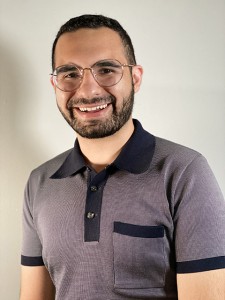
Justin Gonzalez
Justin Gonzalez, B.A. in Cinema and Television Arts, Television Production, Mike Curb College of Arts, Media, and Communication
Growing up, Justin Gonzalez, 22, of Koreatown, knew he wanted to work in the entertainment industry. It was no surprise to his family, since he loved to sing and dance and put on shows for them.
By high school, Gonzalez, one of six children in a blended family, realized that he didn’t want to be in front of the camera, and started looking for a college program that would help him realize his dream of working behind the camera as a producer.
“I remember walking onto the CSUN campus and seeing everything and everybody; it was breathtaking,” he said. “It felt like a place where I wanted to be.”
Gonzalez was heavily involved in extracurricular activities in high school and hoped to do the same at CSUN. The summer of 2018, a year after enrolling at CSUN, he discovered a social media post about the Matador Involvement Center, which connects CSUN students to co-curricular programs, from clubs and organizations to fraternities and sororities, so they can make the most of their college experience. Intrigued, Gonzalez applied to work at the center, sending his resume and a cover letter via his smart phone while visiting his grandmother in Mexico. He got the job.
“You know the saying ‘a job isn’t a job if you love it’?” Gonzalez said. “That’s what I feel about working at the Matador Involvement Center. It presented me an opportunity to get involved and feel like I am part of the campus. It became my second home. I also get to inspire other students by creating events and situations for students to connect with each other.”
Gonzalez still remembers his first multi-camera television production class.
“My heart will stay there forever,” he said. “I am still friends with a lot of people I met in that class. I finally got to really learn and feel what it would be like to work in the real world. I knew I was where I belonged.”
The pandemic turned his senior year at school upside down. He and his classmates were in the middle of making their senior thesis — a short film called “Mano a Mano” that combined the world of lucha libre (Mexican wrestling) with the culinary arts — when everything shut down and they unable to complete their project. At the Matador Involvement Center, he suddenly had to come up with creative, virtual ways to connect students with each other and the campus.
In the midst of it all, television production professor Quinn Saunders invited Gonzalez to apply for a position as a production assistant for the reality television show “Big Brother.” He got what he called “a dream job” working on one of his favorite shows, while carefully following rigid health and safety guidelines.
Just as his work on “Big Brother” wrapped up, Gonzalez’s older sister suffered a series of small strokes and was diagnosed with a rare condition called moyamoya, in which the blood vessels that supply blood to the brain become narrowed. A few months later, his entire family tested positive for COVID-19. His sister’s husband was hospitalized for more than three months. Gonzalez’s family divided their time caring for the couple’s 10-year-old daughter and his sister. He took the weekends.
“Family is family, and we will always be there for each other,” Gonzalez said, adding his family embraced him when he came out as gay in January. “I’ve made it my goal to be there for people, to be happy and hopefully bring light into the world. I know this past year has been a difficult one to get through. But we got through it.”
He’s looking forward to continuing his work with “Big Brother” and starting a career in reality television.
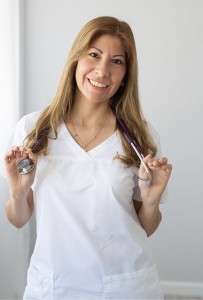
Lorena Gonzalez
Lorena Gonzalez, B.S. in Nursing, College of Health and Human Development
Lorena Gonzalez, 38, of Northridge, teared up as she recalled the first day she arrived at Dodger Stadium to help give COVID-19 vaccine shots.
“It was so impressive to see how many people were there, how many of us nurses were able to come together and give hope to the community,” she said. “I knew I had made the right choice in becoming a nurse. I had done all this studying, all this education, and it was useful. I could help people.”
The fact that Gonzalez is bilingual made her work even more impactful.
“We had a lot of Spanish-speaking people who were afraid, who didn’t know if getting a vaccine shot was the right thing to do,” she said. “But seeing someone who looked like them, who spoke their language, meant they could open up and ask questions. You could see it in their eyes, that they knew that there was someone there that they could trust.”
Gonzalez moved to the United States from Argentina when she was in her late teens, following an older sister who had moved to the Los Angeles area years before.
“I used to come here only for vacation and I really liked being here,” she said. “I saw that there were a lot of opportunities, so I decided to move here.”
Upon arrival, she threw herself into her education. She took English classes and earned an American high school diploma before she enrolled at a community college to begin her nursing studies. Her grandmother had been a nurse, and Gonzalez loved to hear her stories about helping patients.
She initially became a certified nurse assistant, but she wanted to do more. She enrolled in the ADN-BSN Community College Collaborative Program at College of the Canyons, which allows nursing students to begin their education at a community college — earning an associate degree in the process — before completing their bachelor’s degree in nursing at CSUN. The entire process takes only three years.
“I knew it was going to be challenging,” she said. “There were a lot of hours of studying. I did my clinical training in a number of hospitals in a variety of communities, with different cultures and socioeconomic status. Throughout it all, my professors always encouraged and supported me.”
The pandemic hit just as Gonzalez was finishing up the clinical training portion of her degree. Realizing that healthcare workers would soon be overwhelmed, Gonzalez and her classmates immediately volunteered to administer COVID-19 tests and, when they became available, vaccines. She would put in long hours out in the field, and then return home, turn on her computer and attend class.
“It was hard to figure out how Zoom worked, figure out how to take exams and communicate with your professors, but we made it work,” she said.
Gonzalez already has a job with an agency that sets up mobile vaccination clinics in underserved communities. She would eventually like to become a surgical nurse.
In the meantime, she said, “I am putting what I learned in the classroom to use, helping the community. I’m a nurse and I need to be where the community needs me.”
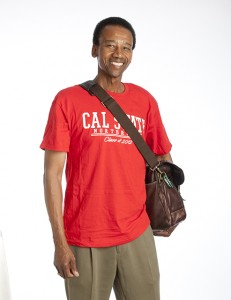
Alphonso Johnson
Alphonso Johnson, M.A. in Secondary Curriculum and Instruction, Michael D. Eisner College of Education
Alphonso Johnson, 70, of Lake Balboa, is an accomplished bass player who, for more than 50 years, has traveled the world accompanying such music legends as Carlos Santana, Phil Collins, Chuck Mangione, Woody Herman, Wayne Shorter, Bob Weir and Quincy Jones. During all that time, he also was a teacher. But it wasn’t until a few years ago that he decided to formalize the vocation.
“Teaching has been a focus of mine since 1995,” said Johnson. “That was when I started teaching music to students at clinics and workshops that were being promoted by music manufacturing companies. I would basically come out and display their latest equipment. At the end, we’d get questions that had to do with education and curriculum. I’d always promised myself that at some point, I’d go back to school and learn how to do it properly.”
Johnson grew up in South Philadelphia, Penn., and quickly discovered he had a natural talent for music. In middle school, he picked up the electric bass and was soon playing house parties in the neighborhood.
“I only knew two songs back then, ‘Summertime’ by Billy Stewart and ‘My Girl’ by the Temptations,” Johnson said. “They were informal gatherings where everyone just wanted to have a good time.”
By the time he reached high school, Johnson had developed a reputation as a serious artist. He turned professional the day he graduated.
“I’ll never forget the experience,” he said. “I stepped off the stage after receiving my diploma. I was met by my mother, who gave me a big kiss and a goodbye hug. I then walked over to a car with seven other musicians and we travelled 90 miles to my first professional job, in Atlantic City, New Jersey.”
Johnson and his friends were playing in a casino as the back-up band for soul and rhythm and blues singer Ronnie Dyson.
Johnson’s career took off. He landed a job with the jazz fusion band Weather Report, taking over for co-founding member Miroslav Vitous. He performed with Phil Collins. He was part of Bob Weir’s side project Bobby and the Midnites. He toured Europe and Japan with composer and saxophonist Wayne Shorter, pianist James Beard, drummer Rodney Holmes and guitarist David Gilmore. He didn’t stop touring until a couple years ago.
Wherever he was in the world, Johnson — now considered one of music’s top bass players — would conduct seminars and clinics on the bass. In 2004, he was invited by the University of Southern California and the California Institute of the Arts to join their music faculties as an adjunct instructor specializing in the electric bass.
It wasn’t until his youngest son graduated from college a few years later that Johnson decided it was time to get a college degree.
“I thought, ‘Wow, he’s setting an example for me,’” he said. “When I was growing up, there wasn’t even a thought that my parents could afford a college education. Now, I had the means, financially, and the motivation to want to go back to school and learn how be a proper teacher.”
He started out at Pierce College before transferring to CSUN in 2011 to get his bachelor’s degree in music education. He decided to stay on at the university and get his master’s degree. “I wanted to challenge myself,” he said.
He described going to college as an older student while still lecturing “as the ability to jump through many hoops at one time.”
“The experience, for me, of going back at my age has been very overwhelming in the sense that it’s not something I really had to do. It’s more something that I really wanted to do deep down inside,” Johnson said. “Getting my master’s degree is a great way to cap off my career. By waiting so long — by the time my son graduated from college — there was a lot of doubt that I would even have the stamina to go back to school. But once I got into it and figured out how to manage my schedule and do all the appropriate readings and assignments, it became fun. It was a lot of fun.”

 experience
experience